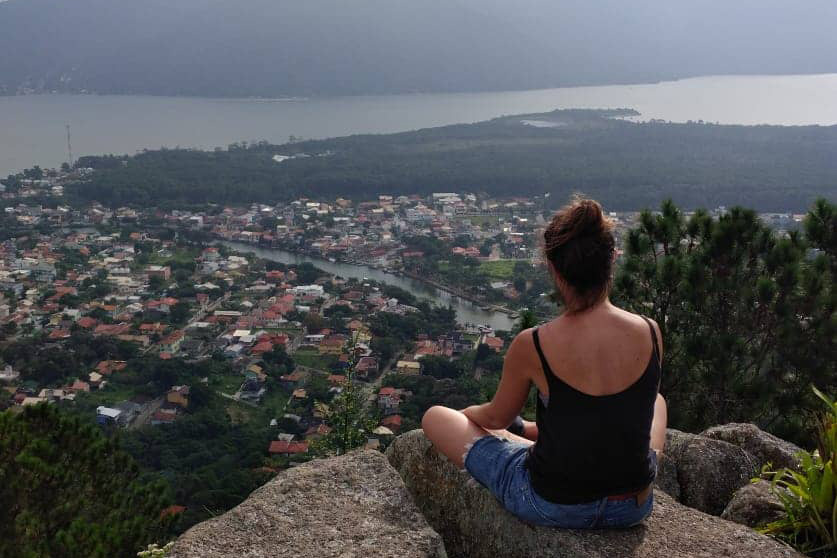Karoliina Loimaala: Exchange studies in Brazil #2

Interdisciplinary groups and individual tracks of studies
Though the title of this programme is Master in a Theatre, it is an interdisciplinary programme of scenic arts, including dance and performance art as well.
In our research group we are a mixture of master and doctorate students including dancers, actors, dramaturgs. We have quite an extensive text to read for each week, and we engage in a changing weekly practice together. The speed of the discussions in class is more upbeat and faster than in Finland, which is both interesting and challenging for me as a person enjoying taking her time. We are a bigger group as well.
Here people have their individual tracks, their individual research that they organize and engage in by themselves, or find people to work with. They choose the classes they do. Many people are from another city, so they may spend the beginning of the week in Florianópolis and go to work in their hometown for 3-4 days of the rest of the week, or even spend one day a week here, and live completely in another city.
The frame of the texts we study, offer a similar theoretical reference palette, as they do in my studies of Choreography in Helsinki. References are often European, North American, written by philosophers, also Latin American, including many feministic texts and sources. It is interesting, that theoretical texts we focus on, seem to be heavily European, though, including Latin America. I ask myself instantaneously, why do I still read European male philosophers?
At the same time, art and practices made, focus on the local. I notice a big interest and research on local dances, dance traditions, indigenous traditions, religious rituals belonging to the Brazilian culture, that always entail a performance. I am wondering if this crossing is because in these specific traditions, the knowledge passed is mainly oral. With the artists making research on these practices, the situation might change. The reasons for the chosen practices people engage to, come from the societal situations here, and talk with the reality here. Artists here are extremely worried, and big parts of people (students of any discipline) are finding ways to fight the current political situation. There is no way to avoid the political.
Since I have already started my thesis process I have done a lot of individual work too. Initially I was supposed to spend more time taking courses and do the thesis work later in year, but now it is taking more time than I planned. In addition to the practical work of my own, I practice jiu jitsu and African dances because of the strong and rich Afro-Brazilian culture and heritage it bears from the African dances.
At the end of my exchange in June I will give a workshop based on the research and work I have been doing here. Then I fly back to continue the Thesis project Purpling (working title), that will premier this autumn in Theatre Academy. One difference in the final project here is a “defense”, that the master students do. They will have to make an oral presentation of their work in addition to the performative one in the end of their master program and to literally defend their work. This procedure I relate more with doctoral studies.
This week was the week of dance. There was a conference with performances each evening, workshops, talks. The performances I saw, were giving a glimpse of different performative traditions. There was a big group piece with a partly title called “A performatic action: Colony, emergent mobility of collective autonomy”. It was a performative result of a workshop given by Cena11, a big dance group in Brazil, performed by the company and 30 workshop participants. One thought arising from the performance was, that in a difficult political time where getting together is power, individuality is still something that easily perseveres.
Other performances were smaller, solos, duos, few artists. Performance of a dance company working on dance tradition of Afro-Brazilian diaspora, Bahian artists forming a choreographic installation, a feminist work on the feminine body from Grupo Corpo from São Paulo.
A moment that has stayed in my mind for some time now, happened in a Butoh workshop, given by an artist from Buenos Aires. We had a final circle of talking after three hours of being between ground and sky, practicing forces and rivers. A woman spoke with tears falling down her face thanking for this time together. There is some artistic freedom in this following quote due to my fleeting memory, though the point remains the same:
“We are living in this world full of horrors, and here we are fighting so much due to the political situation. I am holding myself up day by day. Now I made such simple exercises and felt comfort, warmth, energy started to circulate. I cannot stop the crying.”
***
Writer is Karoliina Loimaala, 2nd year student of the MA in Choreography in Uniarts Helsinki, doing four months exchange in Udesc, Universidade do Estado de Santa Catarina, programme of Master of Theatre, in Florianópolis, Brazil.
Koreoblogi
Koreografian koulutusohjelman blogi on keskustelun ja jakamisen paikka. Täällä koulutusohjelman opiskelijat, henkilökunta ja vierailijat kirjoittavat koreografiasta, opiskelusta, meneillään olevista projekteista, (tanssi)taiteesta ja sen ympäriltä.
Uusimmat julkaisut
Seuraa blogia